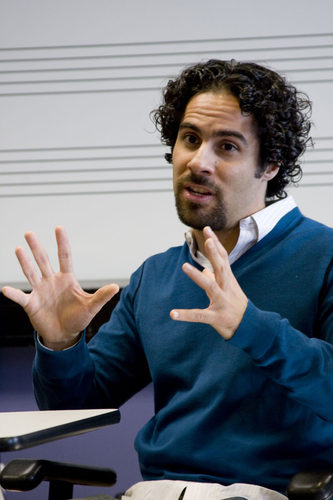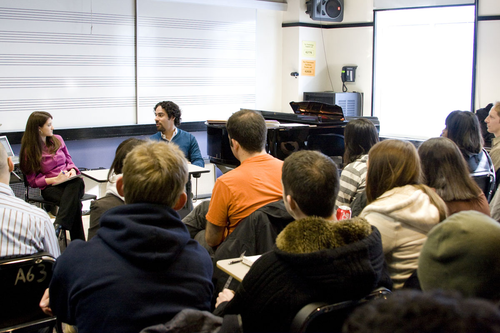In the Heights Musical Director Visits Berklee
Students showing up to the first day of Michael Wartofsky's Musical Theater Writing class had a surprise treat—a visit from Grammy and Tony award-winning alumus Alex Lacamoire '95. Lacamoire won the awards for his musical direction of the Broadway musical In the Heights. Liz Turner, student president of Berklee's Musical Theater Club and an alumus of Wartofsky's class, conducted a Q&A with Lacamoire and then opened it up to questions from the class. Below is a condensed and edited version of their conversation.
Liz Turner: Can you explain what your schedule is like?
Alex Lacamoire: This last week I was doing a workshop for Bring It On: The Musical. Andy Blankenbuehler, the choreographer for In the Heights, he's the choreographer/director; Lin-Manuel Miranda is writing the music; the other composers are Tom Kitt and Amanda Green, both from High Fidelity; the book writer is Jeff Whitty, who wrote the book for Avenue Q. So last week was a lot of fun for me, because I felt like I was kind of the traffic control center. Different composers are bringing in different material; the director/choreographer is asking for a specific vibe, and he might not be getting it; and Lin might write a song that doesn't have an ending, so I've got to figure out how to button the number. So last week was all about staying up until four in the morning because I had to have a vocal arrangement ready for the next day, and waking up at eight and getting to rehearsal and trying to teach the parts. But at the end of the day, it was so much fun, because I was doing what it is that I want to do. Music has always been my passion. And writing has become a passion.
LT: What was it like working on In the Heights?
AL: I think I will be very lucky to have an experience like that in my life again. It started with Lin writing such unbelievable music. I will be honest, what's great about it was that we had a chance to work on his songs. They weren't always perfect coming out of the gate, but even if they weren't, the seed of the idea was so strong, so real, so passionate, that whatever you did, it would blossom into something else. It also started with that core team of people we had. We had Thomas Kail, the director, who set goals for us to work towards. He would say, "Next week we're going to get together at Alex's house and we're gong to hear what Lin's brought in." And sometimes he'd bring in a whole song and sometimes he'd bring in a chorus. But we would still work on it. I was very fortunate to be in on such an early part of the process.
LT: How long was the actual process?
AL: The process of writing it was a good seven years. And Lin will tell you that the first presentation of In the Heights was when he was at Wesleyan College. Of that musical that he wrote in 2001, the only thing that exists today is four notes: (singing) "In Wash-ing-ton Heights." Every other song was gutted. New songs, new characters, new storylines, it just became something else. But it became something else by the work that we put into it, by the workshops that we had, by the goals we had to work towards, by the demos that we made, by the meetings that we had.
LT: What was your favorite number to have worked on?
AL: "Paciencia y Fe"—that's the song that the grandmother sings. It's so old school in its feeling. I had gone to Cuba about a year before I did In the Heights, and I got to see people playing the tres, which is a small guitar with three strings, doubled up each string. When we did "Paciencia y Fe" for In the Heights, my guitar player learned how to play the tres for the show. And it was totally my idea to have a wooden piccolo in there, too, a Cuban instrument called a charanga flute. A piccolo you think of as a marching band, a tinny thing, but a charanga flute is made of wood, so the sound is much more earthy, much more real. So I got to use these cool instruments that are featured in the show, but they get their due in that song.
LT: Explain what it's like to have your music workshopped.
AL: As a writer, I learned to not be precious about what I wrote. I was the arranger of Wicked, and the dance arranger there was Jim Abbott, and what I saw him do just blew my mind at the time. Because he would come in with this dance arrangement totally worked out, and for whatever reason the director didn't respond to it. So Jim said, "Alright, we'll try something else." It was that easy. I, at the time, would have been like, "Can't you hear it? You're just hearing it on piano; with the drums and saxophone it will sound totally different." I would have found any way I could to defend what I wrote. And I find nine times out ten that defense will get you nowhere, because the director is responding to something visceral.
LT: What are you currently working on?
AL: Bring It On is turning out to be really fun, because the arrangements are all being done on laptops in Logic. The music that Lin is writing is so hip-hop and beat-based, I'm finding that just about everything sounds really lame on piano. I'm by no means a power user of Logic, but I'm definitely checking out what it does.
LT: How do you get hired for a gig?
AL: I made my way up as a player. Because I played auditions, the composer hired me for a show; and because he hired me for a show, I became assistant conductor; and because of that I learned how to conduct; and because of that I got to sub; and because of that I got the next gig. It's all been very much a step-by-step process.
The work pays off. I was the associate conductor for Wicked. That's all I was there to do: play piano, and conduct when Stephen Oremus wasn't conducting. But we'd be there in rehearsal and need music to get the dancers off-stage, and the composer wasn't around that day. Someone needed to write the music. So I would say, "How about this?" It just became a matter of me raising my hand and having the guts to say, "I'll do it."


